2022 Week 5: Family Wellness
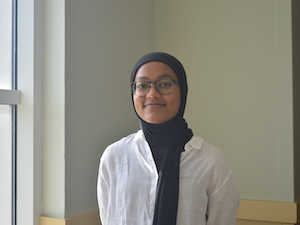 Fatima Elzamzami | Franciscan Center
Fatima Elzamzami | Franciscan Center
One of the things that I’ve been grappling with this past year is whether to pursue an MD or an MD-PhD. Before starting my internship at the Franciscan Center, I was worried that the experience wouldn’t be “medical” enough to give me better insight into whether I wanted my medical career to be centered around research or clinical work. However, by talking to clients on a daily basis I feel as though I am gaining much-needed exposure to some aspects of clinical work, even though they may not be exactly medical in nature. For example, like doctors with patients, I talk to clients about their needs and difficulties they are currently experiencing. Afterward, I work with them to find the best way to realize their goals, whether it be filing for identification documents, applying to receive boxes of non-perishable groceries, or referring them to outside resources that can assist with their needs. This experience has taught me that I really enjoy talking with others and learning their stories and that it’s something that I definitely want to be a center point of my future career. This internship has also allowed me to improve my soft skills, like active listening, organizational skills, and problem-solving, which I will definitely use in my future profession.
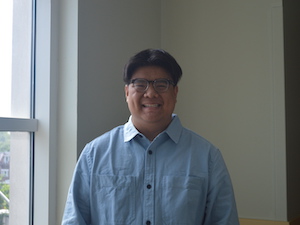 Kobi Khong | Rebuild, Overcome, and Rise (ROAR) Center
Kobi Khong | Rebuild, Overcome, and Rise (ROAR) Center
I am absolutely terrible at icebreakers.
Name, major, year–I’ve got all of those down pat, but when I get to that dreaded “…and tell us something about yourself!” portion of facilitation, I, much like the ice we attempt to break, freeze up entirely. In an instant I forget about every experience I’ve had in the past two decades of life and all my thoughts are replaced with an incessant buzzing, like the static of a TV covered by Comcast.
When I consider myself in my entirety, it takes a moment for me to process what my identity is. I, like everyone else in the world, am composed of a multitude of things, all of which affect me and shape me in a different way. One of the identities that have had the greatest effect on my mindset and decisions is my status as a child of immigrants. My parents left Vietnam almost half a century ago as refugees from the war, but it is still an integral part of our identities here in the United States.
––
There is a stereotype for immigrant families, whether they have immigrated from Vietnam or from Uganda, every expatriate wants their children to be one of three things: 1. Doctor, 2. Lawyer, 3. Engineer. It’s been the subject of everything from sitcoms and comedy specials to therapy sessions, but it’s understandable. My parents came only with what they could hold, the boat that they left on had little room for belongings, it was packed with other families leaving in the dark of night who paid fortunes for the chance to escape. On the boat my mother left on, pirates pulled them over and took everything they had, the only wealth they had were coins my grandmother had hidden in a small urn.
They came here for a better life for themselves and their children, me and my sister. Over the years, they’ve been able to build that life for themselves that they dreamed of despite the obstacles. My dad took classes at community college while working at multiple fast food restaurants to support his twelve siblings and parents. My mom had plans to be a doctor, received acceptance at a prestigious university, and was the first and only in her family to attend college, but had to turn it down when her mom’s kidney failed so that she could collect used bottles for change and attend a local state school so that she could take her mom to the dialysis center three times a week.
In the end, they were able to achieve THE American dream, they were able to get their dream house in the suburbs, send their kid to a fancy college on the east coast, and raise a (dare I say splendid) son, daughter, and mixed miniature pinscher. My mom spent 16 months at a refugee camp in Malaysia and then another 7 months in the Philippines at the age of nine, but now refuses to go camping in anything less than a fully furnished cabin with electricity and running water and now has more letters at the end of her name than those that make up her name (MSN, RN, NEA-BC if you were wondering); my dad now has weekly pickleball sessions on the beach with the other retired dads in his group, friends he used to go to high school with back in Saigon. As much as there are times that I lose my breath arguing with them, I can’t help but be in awe of them.
Me getting into Hopkins was unbelievable, I applied entirely on a whim fully expecting to follow in my parents’ footsteps of attending an in-state university near home. The video of me opening the email with my acceptance is 2 minutes of me forgetting my password and 10 minutes of me on the floor sobbing before going outside to call my parents, who had previously made a secret pact to not mention college decisions unless I did.
When I first attended Hopkins, like many at our school, I had dreams of becoming a doctor. My parents never pushed it on me explicitly, but something that I always felt like I had to do. I felt like it was my duty to pick up the torch and carry it onward. I felt like I, the son of immigrants born into the nation we lived in, I, who was given every advantage in life my parents never had, finally had the opportunity to achieve the dreams that they never could. It’s probably never great to use money as a measurement of success, but it’s something that I had always considered. Our familial love isn’t transactional, but financial security is part of how we showed we care. Your parents take care of you and help you grow so that one day when you’ve finally made it you can return the favor and take care of them.
––
I don’t want to entirely put the blame on AS.030.205, my fall semester class of Introductory to Organic Chemistry I, was just collateral damage in my figuring out who I was and wanted to be. After the fall semester of Sophomore year, and a long and reflective Winter Break and Intersession I decided to drop pre-med. I just couldn’t see myself continuing along that path, and enjoying the future that I had so meticulously planned in my tables and cells in Google Sheets. Along with that, the tantalizing temptress of public health began reeling me in, while every second of learning about carbonyl groups felt like an eternity, learning about systemic issues and social determinants of health invigorated me to learn more and do more in the ways to improve communities. I finally felt like I had a calling and with public health, I felt like I could make real changes for the benefit of communities.
However, one common trend you’ll find searching through public health career forums on the internet is the phrase “Don’t do public health for the money.” This is something that I’ve spent countless nights worrying about, I’ve skimmed every post on every public health forum, stalked a multitude of professionals on LinkedIn, and considered every possible path.
Along with the overarching worry about the economy and world etc., etc, there’s a deeper fear. It’s the idea that in the future I will make less money than my parents and as egotistical as that sounds it’s not from a place of pride it comes from a fear of disappointment. How can I, the recipient of generations of sacrifice from my parents, and their parents, who gave everything they have so that I could have a more successful life than they could have ever have hoped to experience, not accomplish that goal? It’s the undercurrent of feeling that tells me that if my parents were given the same opportunities that they had fought tooth and nail for to give to me, they would have been able to achieve anything that they set their eyes on and take care of everyone that they care about. My dad who quit his first job at The Jack in The Box after a group of high schoolers came in and laughed at his broken English and swore to go to his degree so that he would never have to be treated like that again. My mom, who went back to school to get her master’s degree and couldn’t attend her own graduation since she had to take care of me and my sister.
––
This past week for my Community Impact Internship Program at the Rebuild, Overcome, and Rise center, I tabled at a community event in the City of Baltimore. A bus ride and a couple of blocks of walking away, I sat with my table on the sidewalk for the Community Connect Summer Series Family Fun Night event from the Central Baltimore Community Center Collaborative, handing out fliers, talking about our center’s services for victims of crime, and listening to people’s stories. In them I saw my own parents’ experiences: the lives of people who had everything going against them, yet continued to persevere through, and I had the opportunity to assist them by reaching out to the community. The systemic inequalities in our nation are a bit a ways away from being overturned and dismantled, but with the work, through community organizations, there was a way we could help give people a leg up and a fighting chance.
I felt like I could make an impact (oh so that’s what the letter I stands for in CIIP), and could be proud of the success in the work I could one day be doing. It’s very cliche, but I felt like I could find a new way to define success in a way that I could both make my parents proud and also be proud of my own work. To give their children the chance to pursue their aspirations and ambitions: that is the success of the American dream that my parents believed in and still do believe in.
If all else fails, at least now I have a one thousand five hundred and thirty-two word way to break the ice.
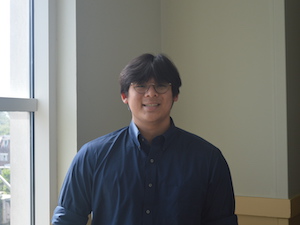 Jonathan Lee | Court Appointed Special Advocates (CASA) for Children of Baltimore
Jonathan Lee | Court Appointed Special Advocates (CASA) for Children of Baltimore
I can’t believe we only have three weeks left of CIIP. Six weeks ago when we started orientation, I had no idea that this summer would go by so fast. Compared to when I returned to Baltimore this summer, I feel a lot more confident and comfortable with getting around the city. Once I get off work and head to the Purple Line, I have a fifteen minute walk to the bus stop that I would typically take the fastest route to. This week, however, I decided to explore some new parts. On Monday, I walked down to the Inner Harbor and checked out Pier 6, the National Aquarium, and some additional tourist sites. I’m not used to seeing a lot of tourists in that area since I’ve never been in Baltimore during the summer. It was refreshing to see a lot of families exploring spots that were just a few minutes from where I worked.
In terms of work, I started working with my supervisor on planning a volunteer event, retreat, and presentation on the history of foster care. While it felt good to have a lot of work to stay busy, I felt somewhat overwhelmed by how much I had to do with only three weeks left. With these tasks in addition to the resource guide I’ve been working on, I’m confident I’ll be able to complete all of these, but I want to make sure that I put 100% effort into each one. I want to end this summer knowing that I learned as much as I can in terms of non-profit work, and I want to make CASA and our volunteers proud. It feels weird that in just a couple of weeks, this chapter of my life will be complete. I’ve been able to learn a lot about myself in terms of juggling various tasks and working remotely in addition to the many intricacies of Baltimore City’s foster care system.
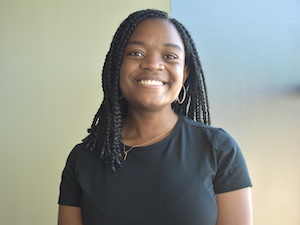 Koye Oputa | BCPS Special Education
Koye Oputa | BCPS Special Education
“Pay attention.” These words have led me to three great surprises in my internship.
The stereotypical media portrayal of dyslexia, particularly when it comes to the writing samples of a person with dyslexia, often shows letters written backwards or letters switching locations within words (e.g. “the” vs. “teh”). However, the writing samples of one of my students with dyslexia, “Zeke,” looked more like arbitrary marks on a page that resembled doodles more than letters. The way that dyslexia presented in Zeke was heavily reminiscent of a rather specific visuo-orthographic deficit that I had studied in one of my cognition classes; it is a deficit that is rarely associated with dyslexia in mainstream circles.
(Surprise I) The more I worked with kids at my internship, the more I realized just how many distinctly unique cognitive impairments were broadly diagnosed as dyslexia. I was further dumbfounded to find how many of these vastly different impairments are treated as if they were all the same. Discussions with a special educator at my internship site, and with my former Cognitive Neuropsychology professor revealed that there is a significant portion of professionals who do not appreciate the various ways in which dyslexia can manifest from person to person, and the disservice such ignorance poses to people with dyslexia. In other words, my conversations with these educators left me with the following warning: “Pay attention.”
I did. A week later, I had begun working in one of my site’s classrooms for students with autism, many of whom are nonverbal.
After working with a student for some time, I realized that he needed to work with non-laminated flash cards in order to focus. I was shocked and humbled to realize that simply noticing the glare on the laminated alphabet flash cards is fascinating (and distracting) for my student could be the difference in whether they progress in the goals laid out for them in their IEP plans.
(II) What shocked me further is that while “paying attention” is one of the most critical skills a special educator or related special needs professional can have, it is one of the skills that educators are most discouraged from practicing when an institution is burdened with a lack of resources, and a large number of students who far outweigh the number of educative support that a school is able to provide. This seems to be a common occurrence in some of the city schools.
(III) With that comes the last surprise: the creative innovation and dedication of educators at my site. Even while being pulled in 20 different directions, a special educator focused herself enough to gather blades of grass for her student to play with upon realizing that grass provided the sensory input he needed to stay focused.
The ingenuity of the people at my internship has not ceased to amaze me, but it does not escape me that such ingenuity is a product of underfunding that prevents schools from providing simple items like sensory materials for their students.
Though it’s disheartening to witness the great level of necessity that mothers the inventions of special educators at Baltimore City Public Schools, it has taught me that a great deal is uncovered when one pays attention.
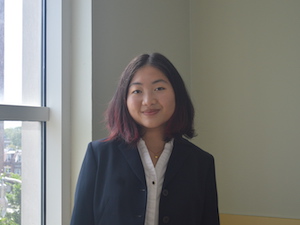 Estelle Yeung | Baltimore Harm Reduction Coalition
Estelle Yeung | Baltimore Harm Reduction Coalition
This week, Baltimore Harm Reduction Coalition held our Demonstration Overdose Prevention Site (OPS) and press conference at the NoMu NoMu art gallery! As I reflect on this week, I’ve come to realize that it’s been transformative for me.
This week taught me firsthand what legislative advocacy can look like in practice. The BRIDGES Demonstration Overdose Prevention Site (BDOPS) project has been a long-term project that began well before my internship at BHRC. I’m so grateful that I got to experience the final week of their “Yes! On My Block!” campaign relaunch and assist with staffing. For the event, BRIDGES members set up three well-lit booths in a mock-use room that would be used for injecting or snorting drugs, in addition to a registration/room attendant table. Behind that setup was a relaxing area with couches that represents the holistic healing aspect of overdose prevention sites. Just like in a real OPS, the room attendant’s job is to collect information such as a participant’s first name, what their plan is for using the OPS today, and if there’s anything they’d like to be reminded of afterwards, such as to see a massage therapist or to pick up a hot meal.
Conversations with coworkers helped me understand why it’s so important for an OPS to be a welcoming space. The demo OPS was a well-lit, open space adorned with plants and beautiful art from NoMu NoMu’s inaugural gallery display. Some people coming through the space for tours thought it was a real, functioning OPS, which shows how such a demo can help policymakers visualize what is being advocated for.
Thursday’s press conference included Mayor Brandon Scott, Baltimore City Health Commissioner Dr. Dzirasa, and Maryland State Senator Shelly Hettleman, who each expressed different reasons for supporting the legalization of overdose prevention sites in Maryland. I’d never seen or been part of a press conference before, so this experience was really eye-opening. BDOPS garnered a lot of media attention for overdose prevention sites, which BRIDGES hopes will help further support at the city and state levels, in addition to support from the general public, for overdose prevention sites in Maryland.
This week showed me that advocating for legislative change requires creativity – the demo OPS was held in a local art gallery that just opened a few months ago. Advocating for legislative change requires collaboration – while staffing the event this week, I spoke with volunteers who had backgrounds in social work and abortion care, but who were advocating for harm reduction and OPS alongside BHRC.
Through BDOPS, I got to witness the incredible passion that my coworkers bring into their advocacy work for overdose prevention sites, and I hope to carry that same kind of passion into my future work.
